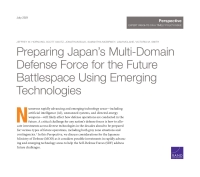Jeffrey W. Hornung, Scott Savitz, Jonathan Balk, Samantha McBirney
Rapidly advancing and emerging technology areas — such as artificial intelligence, autonomy, big data, cyber warfare, electronic warfare, low-cost satellites, directed-energy weapons, and unmanned systems — will likely shape how defense operations are conducted in the future. As a result, governments and defense organizations must determine how to allocate investments to prepare their forces for future conflicts. In this Perspective, RAND researchers explore considerations for shaping Japan's defense technology portfolio, in light of both technological developments themselves and how other countries may employ them. Key trends include the increasing pace of warfare, the enhanced criticality of network security and disruption, the central role of unmanned systems, the increasing accuracy of long-range targeting, the growing ability of aggressors to achieve plausible deniability, the expanding importance of emerging warfare domains, and the elevated importance of deception.
Research conducted by
RAND NATIONAL SECURITY RESEARCH DIVISION
This research was sponsored by the Strategic Planning Division of Japan's Ministry of Defense and conducted within the International Security and Defense Policy Center of the RAND National Security Research Division (NSRD).
This publication is part of the RAND Corporation Perspective series. RAND Perspectives present expert insights on timely policy issues. All RAND Perspectives undergo peer review to ensure high standards for quality and objectivity.
Permission is given to duplicate this electronic document for personal use only, as long as it is unaltered and complete. Copies may not be duplicated for commercial purposes. Unauthorized posting of RAND PDFs to a non-RAND Web site is prohibited. RAND PDFs are protected under copyright law. For information on reprint and linking permissions, please visit the RAND Permissions page.
The RAND Corporation is a nonprofit institution that helps improve policy and decisionmaking through research and analysis. RAND's publications do not necessarily reflect the opinions of its research clients and sponsors.

No comments:
Post a Comment